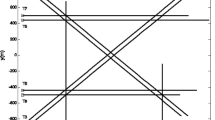Abstract
Probability Hypothesis Density (PHD) filtering approach has shown its advantages in tracking time varying number of targets even when there are noise, clutter and misdetection. For linear Gaussian Mixture (GM) system, PHD filter has a closed form recursion (GMPHD). But PHD filter cannot estimate the trajectories of multi-target because it only provides identity-free estimate of target states. Existing data association methods still remain a big challenge mostly because they are computationally expensive. In this paper, we proposed a new data association algorithm using GMPHD filter, which significantly alleviated the heavy computing load and performed multi-target trajectory tracking effectively in the meantime.
Similar content being viewed by others
References
R. A. Singer and R. G. Sea. A new filter for optimal tracking in dense multi-target environments. Proceedings of the 9th Conference on Circuit and System Theory, 1971, 201–211.
T. E. Fortmann, Y. Bar-Shalom, and M. Scheffe. Sonar tracking of multiple targets using joint probabilistic data association. IEEE Journal of Oceanic Engineering, 8(1983)3, 173–184
Y. Bar-Shalom. Dimensionless score function for multiple hypothesis tracking. IEEE Transactions on Aerospace and Electronic Systems, 43(2007)1, 392–400.
S. S. Blackman and R. Popoli. Design and Analysis of Modern Tracking Systems. Boston, Artech House, 1999, 967–1065.
I. Goodman, R. P. S. Mahler, and H. Nguyen. Mathematics of Data Fusion. Dordrecht, Kluwer Academic Publishers, 1997, 1–151.
R. P. S. Mahler. Statistical Multisource-Multitarget Information Fusion. Norwood, MA, Artech House, 2007, 343–394.
R. P. S. Mahler. Multitarget Bayes filtering via first-order multitarget moments. IEEE Transactions on Aerospace and Electronic Systems, 39(2003)4, 1152–1178.
R. P. S. Mahler. PHD filter of higher order in target number. IEEE Transaction on Aerospace and Electronic Systems, 43(2007)4, 1523–1543..
L. Lin, Y. Bar-Shalom, and T. Kirubarajan. Track labeling and PHD filter for multitarget tracking. IEEE Transactions on Aerospace and Electronic Systems, 42(2006)3, 778–795.
Kusha Panta, Ba-Ngo Vo, and Sumeetpal Singh. Novel data association schemes for probability hypothesis density filter. IEEE Transactions on Aerospace and Electronic Systems, 43(2007)2, 556–570.
H. Sidenbladh. Multi-target particle filtering for the probability hypothesis density. Proceedings of International Conference on Information Fusion, Cairns, Australia, 2003, 800–806.
B. N. Vo, S. Singh, and A. Doucet. Sequential Monte Carlo methods for multi-target filtering with random finite sets. IEEE Transactions on Aerospace and Electronic Systems, 41(2005)4, 1224–1245.
B. N. Vo and W. K. Ma. The Gaussian mixture probability hypothesis density filter. IEEE Transactions on Signal Processing, 54(2006)11, 4091–4104.
Yin Jianjun, Zhang Jianqiu, and Zhuang Zesen. Gaussian sum PHD filtering algorithm for nonlinear non-Gaussian models. Chinese Journal of Aeronautics, 21(2008)4, 341–351.
Y. Bar-Shalom and X. R. Li. Multitarget-Multisensor Tracking: Principles and Techniques. Storrs, CT, YBS Publishing, 1995, 1–98.
J. Hoffman and R. Mahler. Multi-target miss distance via optimal assignment. IEEE Transactions on Systems, Man, and Cyberneticas, 34(2004)3, PartA, 327–336.
Author information
Authors and Affiliations
Corresponding author
Additional information
Supported by the National Natural Science Foundation of China (No. 60772154) and the President Foundation of Graduate University of Chinese Academy of Sciences (No. 085102GN00).
Communication author: Huang Zhipei, born in 1973, female, Assistant Professor.
About this article
Cite this article
Huang, Z., Sun, S. & Wu, J. A new data association algorithm using probability hypothesis density filter. J. Electron.(China) 27, 218–223 (2010). https://doi.org/10.1007/s11767-010-0304-0
Received:
Revised:
Published:
Issue Date:
DOI: https://doi.org/10.1007/s11767-010-0304-0
Key words
- Multi-target trajectory tracking
- Probability Hypothesis Density (PHD)
- Gaussian mixture (GM) model
- Multiple hypotheses detection
- Peak-to-track association




